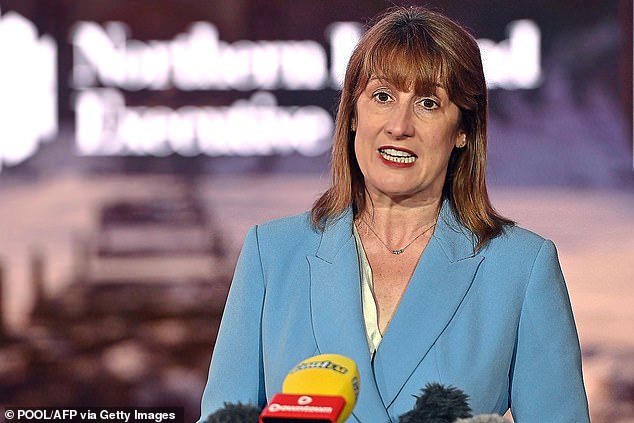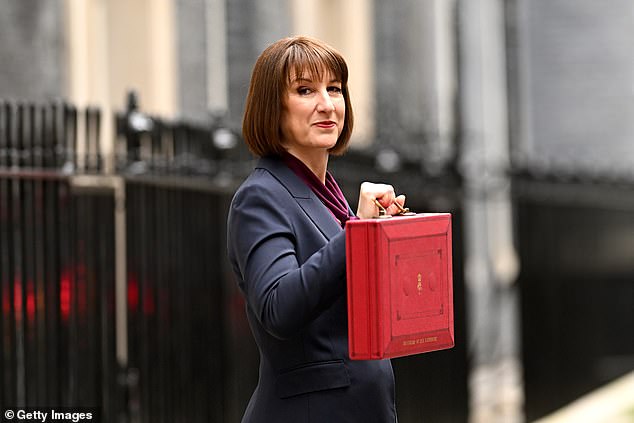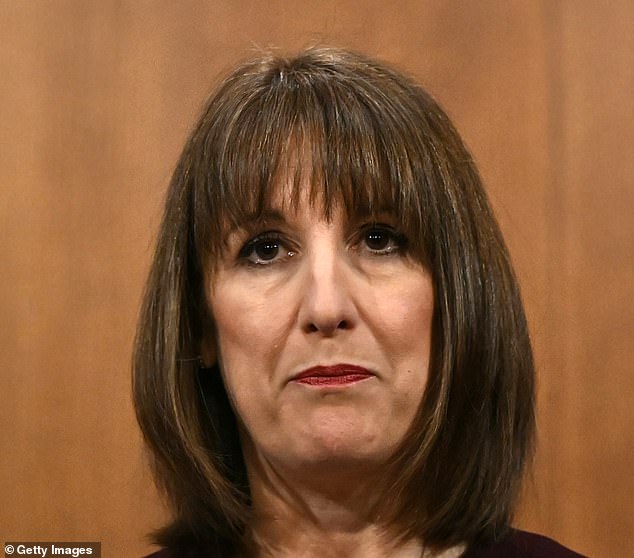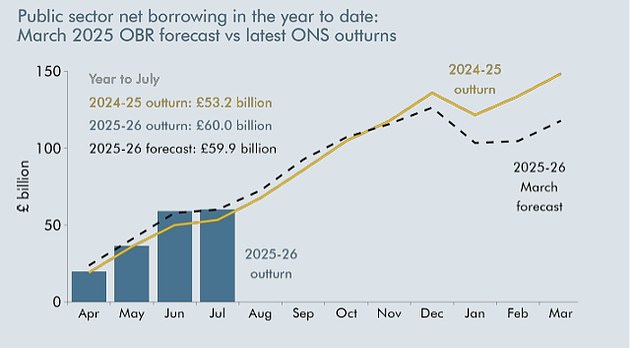Chancellor Rachel Reeves is plotting a ‘stealth tax raid’ on workers in the next budget as she looks to plug a £50billion black hole in public finances, according to a report.
The plans will spell a blow for workers’ pockets in a move which would raise roughly £7bn a year if kept until the end of the decade.
The stealth tax raid would raise billions as more workers are pushed into higher tax brackets with thresholds frozen, forcing them to pay higher income tax rates despite missing out on real pay rises.
Labour has pledged not to raise taxes on ‘working people’ and ruled out increasing income tax rates, meaning the move would be highly controversial.
Extending the freeze would contradict Ms Reeves’ words at the Budget last year, where she admitted that extending it would ‘hurt working people’.
But extending the freeze now appears to be one of the few options available to the Chancellor to plug the deficit without breaking Labour’s manifesto, a source told The Telegraph.
‘There’s ‘hot’ and then there’s ‘very hot’, and [this option] is on the very hot list,’ the source said.

Chancellor Rachel Reeves is plotting a ‘stealth tax raid’ on workers in the next budget as she looks to plug a £50billion black hole in public finances

The Labour minister is reportedly set to introduce a six-year freeze on income tax thresholds rather than increasing them in line with the cost of living or inflation
No decisions have been finalised but a threshold freeze is said to be viewed more favourably than a raid on pensions.
A freeze on income tax thresholds has remained since being introduced by the Conservatives in 2021.
Higher gambling taxes are also reportedly set to be introduced at Ms Reeves’ second Budget this autumn despite extensive lobbying from the industry to protect horse racing from higher levies.
Labour raked in a record £100bn of taxes last month but there are mounting fears that the Chancellor is coming for more with the public finances in ‘chronically weak condition’.
The haul – the highest ever for July – was boosted by Ms Reeves’ employer national insurance raid. However, that policy is also blamed for making it harder for firms to hire and pushing up unemployment.
Labour’s tax hike also saw national insurance bring in an extra £2.6bn last month compared to last year and £9.5bn extra for the financial year to date.
It helped the government bring July’s borrowing – the gap between tax revenues and spending – to a lower than expected £1.1bn.
That is down from £3.4bn in July last year. However, total borrowing for the financial year so far, from April to July, is running at £60bn, £6.7bn ahead of 2024.

Sir Keir Starmer was forced to push back at suggestions that Ms Reeves would introduce further tax hikes in the next budget as Labour looks to close the £50bn hole in public finance

Extending the freeze would contradict Ms Reeves’ words at the Budget last year, where she admitted that extending it would ‘hurt working people’
Earlier this month, Sir Keir Starmer was forced to push back at suggestions that Ms Reeves would introduce further tax hikes in the next budget as Labour looks to close the £50bn hole in public finances.
The Prime Minister said Ms Reeves would focus on ‘living standards’ and ‘making sure that people feel better off’ in Labour’s next fiscal package.
Even as the tax take surges, spending is ballooning thanks to pay rises for civil servants and Britain’s soaring benefit bill.
Meanwhile, Britain’s debt pile stands at a staggering £2.89trillion, or 96 per cent of the size of the economy. And the cost of servicing that debt so far this year is £41bn.
Economists think the Chancellor will need to put up taxes even further in Autumn.
Conservative business spokesman Andrew Griffith said: ‘With the amounts being squeezed out of taxpayers at record highs yet the Chancellor still craving more, either she quits her addiction to higher public spending or someone needs to send her to rehab’.
Experts said the public finances remain fragile after U-turns on welfare reforms and winter fuel payments wrecked the Chancellor’s plans and as traders in UK bonds, known as gilts, lose faith in Labour – pushing up the cost of borrowing to levels not seen since the 1990s.
Meanwhile, economic growth is slowing and doubts are growing about whether Britain’s dismal productivity growth – the ability to work more effectively and get more done per hour – can be restored to the levels needed to sustain a recovery.
That looks increasingly likely to spell further painful tax rises in October’s budget.
Elliott Jordan-Doak, senior UK economist at Pantheon Macroeconomics, said: ‘The big picture remains that the public finances are in chronically weak condition.

‘The Chancellor faces surging gilt yields and a likely productivity downgrade from the OBR [Office for Budget Responsibility] in the October forecast round.
‘The litany of policy U-turns has only compounded the Government’s fiscal woes’.
A Treasury spokesman said: ‘As set out in the Plan for Change, the best way to strengthen public finances is by growing the economy – which is our focus.
‘Changes to tax and spend policy are not the only ways of doing this, as seen with our planning reforms, which are expected to grow the economy by £6.8bn and cut borrowing by £3.4bn.
‘We are committed to keeping taxes for working people as low as possible, which is why at last Autumn’s Budget, we protected working people’s payslips and kept our promise not to raise the basic, higher or additional rates of Income Tax, employee National Insurance, or VAT.’
They added: ‘The UK’s gambling tax system is outdated and inconsistent which is why we are consulting to level the playing field so all online gambling pays the same rate, working closely with the horse racing sector.
‘We have no plans to change the way bets made at the racecourse are taxed, which are exempt from duty.’












